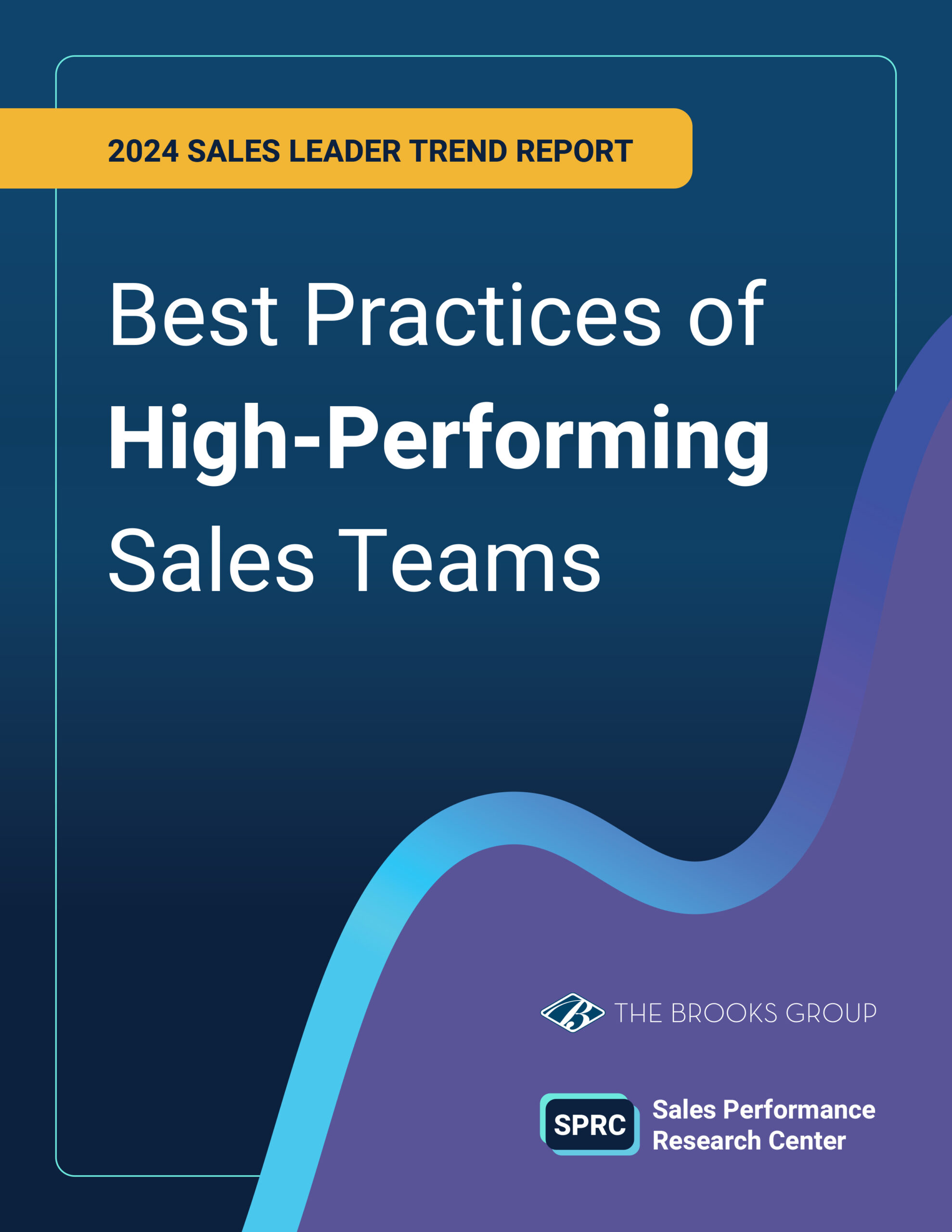Unless you sell a one-of-a-kind product, you’re up against competitors with similar offerings. When this is the case, the most important thing you can do is differentiate yourself. You need to stand out to make buyers want to do business with you.
Many sales leaders think the way to do this is to help their sales team sell better value or overcome objections. These are both good strategies, but the true differentiator is the sales professional and their emotional intelligence.
Successful sales professionals differentiate themselves three ways:
- They are highly emotionally intelligent.
- They put buyers’ wants and needs ahead of their own.
- They build long-term relationships based on reciprocity.
This blog post dives into how you can develop these three sales differentiation skills to set yourself apart.
Don’t Forfeit Your True Differentiator
First, a quick story: Three years ago, I bought a refrigerator from someone who worked at one of the big home improvement stores. Later, when I needed a dishwasher, I found his card and gave him a call. We arranged to meet at the store.
Right before I hung up, he said, “By the way, I don’t work at [name of store] anymore. I work at [new store].” I didn’t care. He was so good I wanted his help buying a new dishwasher, no matter what store he sold for.
The biggest issue I see is that sales professionals often forfeit their true sales differentiator: themselves. If you don’t think that’s true, why even be a seller? People could just go direct and buy wholesale.
The truth is you buy from people you like. It has very little to do with the brand or the product.
The Gateway to Differentiation: Emotional Intelligence in Sales
The main way to differentiate yourself is to have a keen sense of people. The best sellers have very high emotional intelligence (EI), which refers to the capacity to understand their own emotions as well as those of others. They understand what people want and need, and they understand emotional triggers.
EI is also the foundation of sales, and the gateway to all of that is empathy. The people who have this skill not only sell more; they sell better business—better terms, better margins—because they’re able to create relationships.
When I lead sales teams, the first thing I do is look at sales professionals’ ability and relationships. If they have good relationships and can get things done within their own organizations, that means they have that skill set. They’re empathetic and highly emotionally intelligent.
EI is a perishable skill. It’s also something you can learn. The good news is sales professionals have the ability to improve EI.
“Emotional intelligence refers to a different way of being smart. EI is a key to high performance, particularly for outstanding leadership. It’s not your IQ, but rather it’s how you manage yourself and your relationships with others.” —Daniel Goleman, psychologist and author of Emotional Intelligence.
Three Types of Sales Professionals
There are three types of sales professionals. The bottom 20% focus on two things: “How do I make my number?” and, “How do I stay alive?”
The middle 60% focus on three things: their product, their ego, and their income. They want to rep a good product, they think well of themselves, and they want to make money.
The top 20% is where you want to be. These sales professionals focus on buyer needs, and they’re non-judgmental about those needs.
The bottom 20% and the top 20% focus on diametrically opposed things. The bottom tier focuses on themselves. They try to solve the buyer’s problem with their solution. Sometimes that’s not the right fit.
These “bottom” sales professionals do one of two things: They either give the customer everything they want (cave and concede) or they do the opposite—they don’t bend enough. They want everything the way they want it and they don’t really understand and empathize with the buyer.
On the other hand, top-tier sales professionals differentiate themselves through their keen ability to understand what a buyer really wants and needs, whether or not the seller can give it to them.
They don’t default to product or price and forfeit the fact that they are the differentiator. They have the ability to connect with people in a way that’s different than the competition.
Focus on Your Buyer Needs
Before you can be a good salesperson, you have to be a good businessperson. This means understanding where your product or service fits into the marketplace, aggressively prospecting those types of opportunities, and realizing what you are and what you’re not.
For example, does Nordstrom market to the Walmart customer, and vice versa? No, they don’t. They’re good businesspeople. They know who the buyer is.
You can’t be all things to all people. You need to be very clear-eyed and narrow the focus. You don’t have to have the highest quality product. You just have to know who that product appeals to. Your customer is going to buy from the person who builds the most credibility and is most empathetic.
Four Ways to Differentiate Yourself in Sales
1. Develop Emotional Intelligence
Sales professionals with high emotional intelligence empathize with their prospects, understand their motivations and concerns, and adapt their approach accordingly. They are skilled at building rapport, managing objections, and navigating challenging conversations with grace and empathy. By connecting on an emotional level, sales professionals build stronger relationships and differentiate themselves as trusted advisors rather than just transactional sellers.
Action Step: Take a sales assessment to evaluate your EI strengths and weaknesses. Then apply those insights to develop your skills. Sales leaders can learn their team’s potential with an emotional quotient assessment.
2. Put Prospects First
Instead of solely focusing on promoting your product or service, top sales professionals prioritize understanding prospects’ needs, challenges, and objectives. They take the time to listen actively and ask insightful questions to uncover the root of their problems. By demonstrating genuine interest and empathy, salespeople build trust and credibility, setting themselves apart from those who simply deliver a sales pitch without considering the prospect’s specific situation.
Action Step: Practice asking probing questions to uncover prospect wants and needs before presenting solutions.
3. Share Control of the Outcome
Traditional sales approaches often involve a one-sided interaction where the salesperson tries to convince the prospect to buy. However, modern sales professionals recognize that collaboration and mutual decision-making lead to stronger partnerships. By involving the prospect in the decision-making process and providing them with options and alternatives, salespeople empower buyers to feel ownership over the solution.
Action Step: Use a consultative selling approach to foster a sense of partnership and ensure the solution meets the prospect’s unique needs.
4. Provide Value Beyond the Sale
Top sales professionals understand that their role extends beyond closing deals; it involves building long-term relationships and delivering ongoing value to customers. Whether it’s providing industry insights, offering training and support, or connecting customers with additional resources, salespeople who go above and beyond to support their customers differentiate themselves as trusted partners rather than transactional vendors.
Action Step: Demonstrate your on-going commitment to buyer success to strengthen customer loyalty and generate referrals.
Distinguish Yourself for Long-Term Sales Success
Sales professionals can differentiate themselves by demonstrating high emotional intelligence, prioritizing their prospects’ needs, collaborating with them to achieve mutually beneficial outcomes, and communicating value and support beyond the initial sale.
By helping your sales team take these steps, you can empower them to distinguish themselves as trusted advisors and partners, driving long-term success for both your organization and your customers.
Give your team the selling skills they need to deliver results. Get more info about our Emotional Intelligence in Sales workshop.
2024 Sales Leader Trend Report
Best Practices of High-Performing Sales Teams
What do top performing sales teams do differently? We surveyed B2B sales leaders across multiple industries at organizations to discover the answer.
In this research report, we share what the best sales teams do differently.




